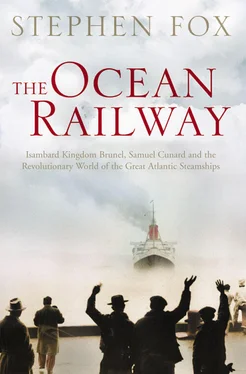So wedded to the progressive nineteenth century, their work helped change the world within their lifetimes. Whatever they may have thought about this grand transformation has been lost to history, except for off-hand hints. Robert Napier’s fine mansion at Shandon on the Gareloch preserved a lingering trace of the old world within its opulent outer walls. The house was built in successive additions around the original modest cottage. A visitor in 1855 marvelled at the many beautiful paintings and art objects in the plush outer rooms. David Elder, a music lover, had made his boss a waterpowered pump for the pipe organ in the main gallery. Napier, sixty-four years old in 1855, liked to show the treasures from his lifetime of collecting. At the core of the mansion, happy to remain behind in one of the old cottage’s small rooms, sat his wife, Isabella Napier Napier. ‘ A very simpleand unaffected Scotch woman,’ the visitor surmised. The mother of seven children, five still living, she sat spinning by the fireplace, moving steadily to a rhythm older than steam on water. The great Steam Age roared on, around and past her.
PART TWO: The Era of Cunard Domination, 1840-1870
3. Ships as Enterprise: Samuel Cunard of Halifax
The Samuel Cunard who appeared so mysteriously in Boston on his Britannia in 1840 had come from a tumultuous family history of upheaval and dislocation, of religious and political persecution, and then of neglect and alcoholism in his parents’ generation. In the absence of much given structure, he had attained a preternatural early maturity on his own. He essentially invented himself and then took on necessary paternal roles for his younger siblings. Having emerged from such an uncertain background, he might reasonably have wanted a safe future based on some dependable job that provided a secure living. Instead he dealt in ocean ships and shipments, with all their endemic risks and uncertainties. Cunard would spend his working life worrying about cargoes and profits, captains and crews, and an occasional overdue vessel plying the pitiless North Atlantic Ocean. ‘ Those who havethe charge of ships,’ he wrote in old age, ‘are never free from anxiety.’
Sam Cunard was descended from a group of German Quakers who came to America in 1683. His great-great-grandfather, Thones Kunders, lived in the German town of Crefeld, on the lower Rhine River near the Dutch border. Kunders and his family were religious dissenters, first as Mennonites, then Quakers, at odds with local established church authorities. William Penn granted the Crefeld Friends about 18,000 acres in his Quaker haven of Pennsylvania. They sailed away from intolerance in July 1683, thirteen men with their families, thirty-three people in all: among the minority of immigrants to America who came not for economic opportunity but for reasons of conscience, to worship as they wished. The pilgrims from Crefeld landed in Philadelphia after a voyage of seventy-four days.
They settled an area to be known as Germantown, later incorporated into greater Philadelphia. For three years, until they put up a meetinghouse, the Crefeld Friends worshipped at the home of Thones Kunders. He worked as a textile dyer, his trade in the old country, and was appointed one of the local burgesses by William Penn. Kunders died in 1729, ‘ an hospitable, well-disposed man, of an inoffensive life and good character’. At some point he had Americanized his name to Dennis Conrad. In 1710 his sixth child, Henry, married the daughter of another Crefeld colonist. They bought a farm of 220 acres in Montgomery County and had six sons, who later spelled their last name four ways. (With the trail thus obscured, the family line has puzzled genealogists.) Henry’s son Samuel took the name Cunrad. In turn, Samuel’s son Abraham, born in 1754, later switched two letters and came up with Cunard, where the matter finally rested.
According to an oral traditionpassed down within the family, Thones Kunders and his sons were ploughing a field one day when they turned up a bag of gold coins – perhaps a pirate’s loot, brought ashore and buried but never recovered. This windfall helped establish the family in America. The story, if true, marks the first hint of what afterwards was called ‘Cunard luck’ or the ‘luck of Cunards’. Four generations later, Sam Cunard’s good fortune in his ever-dangerous shipping business was sometimes ascribed – especially by frustrated competitors – not to alertness or hard work but to his unfair, unearned, uncanny luck.
The American Revolution, however, brought the family nothing but bad luck. As Quakers, the descendants of Thones Kunders could not support the revolutionary cause. The Quaker peace testimony prohibited any violent opposition to governments. Pennsylvania Friends felt no great loyalty to British authority; their pacifism simply made all wars untenable. The local rebels, mainly Presbyterians, took their opportunity to cut into the power of the more established Quakers. This complex internecine conflict, fuelled by both religion and politics, became quite bitter. The rebels would place candles in their windows at night to celebrate American victories; Quaker windows without candles might be broken. Friends who declined to join public fast days might have their businesses attached or lose blankets and horses to rebel army requisitions. Soldiers could be billeted in Quaker homes. Quakers could be fined for refusing muster duty or an oath of allegiance to the rebels. Some, like Abraham Cunard’s cousin Robert Cunard, were convicted of treason and had their property confiscated.
During the war, and especially after the final American victory, many Quakers (including Abraham Cunard) left for the Loyalist stronghold of New York. When New York in turn fell to the rebels, much of its swelling Loyalist community was banished to the British outpost of Nova Scotia. An elite group of Loyalists petitioned British colonial authorities for land grants and other privileges in their new Canadian home. Abraham Cunard joined a less well-connected group of nine hundred others bound for Nova Scotia in asking for their own considerations. ‘ Chagrined as yourMemorialists are at the manner in which the late Contest has been terminated,’ they declared, ‘and disappointed as they find themselves in being left to the lenity of their Enemys…your Memorialists humbly implore redress from your Excellency and that enquiry may be made into their respective Losses Services Situations and Sufferings.’ Cunard sailed to Nova Scotia with a flotilla of Loyalists in the spring of 1783. Exactly one hundred years after his ancestors had come to America for religious freedom, political and religious strife now forced him to leave home for another new land in a wilderness.
Perched at the southeastern edge of Canada, technically a peninsula but actually more like an island, Nova Scotia in 1783 was a raw frontier territory. It had been lightly settled by immigrants from England, Scotland and Germany, and by Americans from nearby New England states. During the war it became a bristling garrison for British army and navy forces, who dominated the principal town of Halifax. The newly arrived Loyalists, lured by favourable reports, were generally disheartened by what they found. ‘ All our goldenpromises have vanished,’ said one Loyalist. ‘We were taught to believe this place was not barren and foggy, as had been represented, but we find it ten times worse.…It is the most inhospitable climate that ever mortal set foot on. The winter is of insupportable length and coldness, only a few spots fit to cultivate, and the land is covered with a cold, spongy moss, instead of grass, and the entire country is wrapt in the gloom of perpetual fog.’ Yet Nova Scotia was the most accessible place from New York still under British rule, closer than the West Indies or the Canadian interior, with rich fishery and timber resources and, at Halifax, one of the finest natural harbours in North America. By the end of 1783 some 20,000 Loyalist refugees had arrived, more than doubling the local population.
Читать дальше












